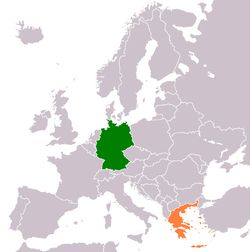Germany–Greece relations
The Germany–Greece relations are the relations between Germany and Greece. Greece has an embassy in Berlin and eight General Consulates in (Hamburg, Hannover, Cologne, Leipzig, Munich, Düsseldorf, Stuttgart and Frankfurt). Germany has an embassy in Athens and a General Consulate in Thessaloniki.
 | |
Germany |
Greece |
|---|---|
| Diplomatic mission | |
| Embassy of Germany, Athens | Embassy of Greece, Berlin |
Germany and Greece are full members of the Organization for Security and Co-operation in Europe, of the Organisation for Economic Co-operation and Development, of NATO, of the European Union, and of the Eurozone.
History of bilateral relations
.jpg)
Diplomatic relations between Byzantine Greeks and Germans trace back to the Middle Ages and the Byzantine Empire.
The first King of independent Greece, Otto I, was of German descent, and many Bavarians came and settled in the new state, while his father, Ludwig I of Bavaria, had aided financially and politically the Greeks during their War of Independence and after the enthronement of his son.
Greece and Prussia established diplomatic relations in 1834, the same year both countries exchanged embassies.[1]
The two countries were enemies during both World Wars, with Germany taking part in the Axis Occupation of Greece during World War II. The issue of reparations for German war crimes and the forced loan during the Occupation continues to be unsettled. There is a 300,000 people Greek community living in Germany, most of them came during the 1960s and 1970s.
The two nations enjoyed excellent relations for 60 years (1950- 2010) with Germans to be the first nation of tourist arrivals in Greece during 1970s, 1980s,1990s, 2000s[2] and the first European destination of Greeks immigrating abroad (mainly 1950s, 1960s). Moreover, Greece supported the German Reunification during 1980s and the two countries cooperated in many sectors (culturally, technologically, army etc.) under the EU spectrum.
In 1999 the Greek foreign minister Theodoros Pangalos caused a diplomatic crisis when he stated that "Germany is a political dwarf"[3] and later apologized.
However, relations were strained during the European sovereign-debt crisis between the nations.[4] In 2011 and 2012 the Greek national council for the German reparations called for a boycott on German products.[5]
German community of Greece
See German Greeks.
The German Archaeological Institute at Athens opened in 1874, the German School of Athens in 1896.
List of bilateral treaties[6]
- Bilateral cultural agreement, 17 May 1956
- Treaty of residence and shipping, 2 September 1961, which also addresses military conscription matters for persons with dual nationality
- Agreement for the avoidance of double taxation, 18 April 1966
After 1981, most agreements were made through the European Union.
List of recent bilateral visits
- April 2000: visit by President of Germany Johannes Rau
- 22 January 2004: visit by Greek Foreign Minister George Papandreou
- December 3, 2004: visit by Greek Foreign Minister Petros Molyviatis
- 15–16 February 2006: visit by Greek Prime Minister Kostas Karamanlis and Greek Foreign Minister Dora Bakoyannis
- 23 June 2006: visit by Germany Foreign Minister Frank-Walter Steinmeier
- 18–22 September 2006: visit by President of Greece Karolos Papoulias
- 20 July 2007: visit by Chancellor of Germany Angela Merkel
Diplomacy
|
|
Embassies
The Embassy of Germany is located in Athens, Greece. The Embassy of Greece is located in Berlin, Germany.
External links
Notes
- "Archived copy". Archived from the original on 2009-08-01. Retrieved 2009-01-18.CS1 maint: archived copy as title (link) Greek Ministry of Foreign Affairs about the relation with Germany
- http://sete.gr/_fileuploads/entries/Statistics/Greece/International%20Tourist%20Arrivals%20(Non-Residents)/catID51/EN/140422_Eiserxomeni%20taksidiotiki%20kinisi%20mi%20katoikon%20stin%20Ellada%20ana%20xora%20proelefsis%202005-2013.pdf
- Θ.Πάγκαλος tovima.gr
- German Patience With Greece on the Euro Wears Thin 8 May 2012.
- Μποϊκοτάζ στα γερμανικά προϊόντα iefimerida.gr
- http://www.mfa.gr/www.mfa.gr/en-US/Policy/Geographic+Regions/Europe/Relationships+with+EU+Member+States/Germany/Greek Ministry of Foreign Affairs about the relation with Germany


